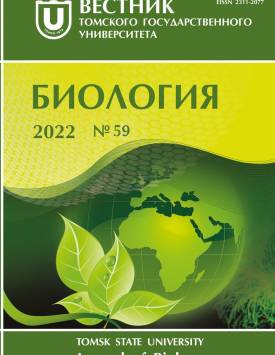The Effect of Microencapsulated Starter Cultures on the Formation of Biologically Active Peptides in Finished Meat Products
Of particular importance in the production of fermented meat products are starter cultures with a proteolytic system that promotes the proteolysis of the protein components of meat raw materials. Numerous compounds, which may have biological activity, were formed as a result of the proteolysis, for example, biologically active peptides or bacteriocins. Nevertheless, there are some technological difficulties in the use of bacteria that contribute to the formation of biologically active peptides in raw meat. The solution to this problem can be microencapsulation. In this study, industrially valuable strains of starter cultures were selected, and proteolytic activity genes were identified. Thus, the proteolytic genes of the PRTB10/PRTB20 and P15C/P06C families were found in the P. acidilactici 38 and P. pentosaceus 28 strains, while the genes of the Jp23/Jp25 and prti2/IP6Xba families were found in the L. acidophilus AT-45 strain. The prti2/IP6Xba genes were also found in the S. carnosus 111-2 strain. A technology is proposed for incorporating microorganisms into alginate capsules with an alginate gel concentration of 5%, which makes it possible to form strong capsules capable of maintaining the viability of starter cultures in the production of boiled sausage: when incubating heat-treated capsules to 72 °С on chalk agar, the survival rate of microorganisms from 30 to 90% was recorded. The protein profile of the samples of boiled sausages produced using microencapsulated starter cultures was studied. A significant interaction of some strains with proteins of the actomyosin complex was shown, and the enzymes of energy metabolism from muscle tissue were subjected to destructive changes - muscle creatine phosphate kinase, enolase, and adenylate kinase 1. The paper contains 4 Figures, 4 Tables, and 27 References. The Authors declare no conflict of interest.
Keywords
starter cultures, microencapsulation, sodium alginate, raw meat, proteomics, biologically active peptidesAuthors
| Name | Organization | |
| Afanasev Dmitry A. | Gorbatov Federal Center for Food Systems RAS | dmitr.afanasjew2010@yandex.ru |
| Chernukha Irina M. | Gorbatov Federal Center for Food Systems RAS | imcher@inbox.ru |
| Ganina Vera I. | Razumovsky Moscow State University of Technology and Management | vigan5428@yandex.ru |
| Mashentseva Natalya G. | Moscow State University of Food Production | natali-mng@yandex.ru |
| Kovalev Leonid I. | Federal Research Center "Fundamentals of Biotechnology" of the Russian Academy of Sciences | kovalyov@inbi.ras.ru |
| Kovrizhnykh Anna V. | Moscow State University of Food Production | anya-1998@mail.ru |
| Ahangaran Mahboobeh | Moscow State University of Food Production | ahangaran@hotmail.com |
| Gharaviri Mahmud | Moscow State University of Food Production | gharaviri@hotmail.com |
References

The Effect of Microencapsulated Starter Cultures on the Formation of Biologically Active Peptides in Finished Meat Products | Vestnik Tomskogo gosudarstvennogo universiteta. Biologiya - Tomsk State University Journal of Biology. 2022. № 59. DOI: 10.17223/19988591/59/2
